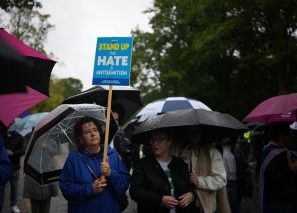 I’ve just come back from the Policy Exchange party, which had an austerity feel to it: smaller guest list, no bubbly. And David Cameron gave a good, but rather low-key speech where he said he was pleased that his speech at LSE today went past with no tomatoes being thrown. LSE has a left-wing reputation, Cameron said, so he was pleasantly surprised to see queues around the block.
I’ve just come back from the Policy Exchange party, which had an austerity feel to it: smaller guest list, no bubbly. And David Cameron gave a good, but rather low-key speech where he said he was pleased that his speech at LSE today went past with no tomatoes being thrown. LSE has a left-wing reputation, Cameron said, so he was pleasantly surprised to see queues around the block.
The LSE does have a reputation as a hotbed of leftism. But it is also the spiritual home of fiscal conservatism. It was here that Frederick von Hayek came in the 1929 invited by Lionel Robbins. The two of them built the LSE economics department into perhaps the most formidable nerve centre of free-market economics in Europe – at a time when socialism, in its nationalist and Marxist variants – was taking the continent by storm. They also fought the Keynesians who emerged later in Cambridge. The LSE gathered other free-market heroes: Arnold Plant and the young Arthur Seldon who went on to set up the IEA.
Hayek is Austrian, as is von Mises – hence the notion that the ideas which so influenced Keith Joseph and Thatcher in the late 1970s were somehow foreign But the reverse is actually the truth. Hayek came to England because he (as the rest of the Austrian school did) considered it the cradle of economic liberalism: he considered his emigration an intellectual homecoming. As he put it in 1985:
Emotionally and intellectually, England was my climate and still is. It isn’t really that the English are more intelligent than the others, but they have great social strength.
So the LSE kept the torch of free markets burning in the 1930s and postwar era, and this torch went on to light the economic counter-revolution of the 1980s. David Cameron couldn’t have picked a better venue to try to set a new flame going today.







Comments